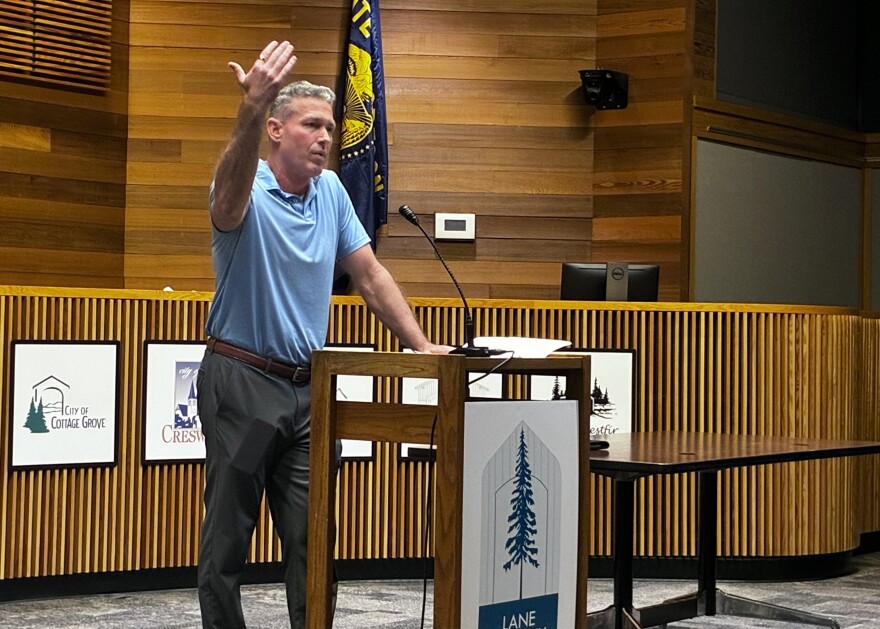Lane County’s jail deflection program celebrated its four newest graduates at a ceremony in Eugene Friday.
Deflection is an alternative to criminal charges for people accused of low-level crimes, including minor drug possession. Clients are connected with peer navigators who help them locate social services.
A person can also enter into Lane County's program voluntarily without facing criminal charges.
On Friday, a small crowd of law enforcement, friends and peer navigators gathered in Harris Hall, located inside Lane County's courthouse. They shared stories about the newest cohort to make it through the program.
Program Coordinator Clint Riley told KLCC it was rewarding to see how deflection had changed some of these people's lives.
"We were able to help people that were in a spot where a little bit of assistance would get them to a point of being successful again," said Riley. "Just a little bit of assistance goes so far."
Jesse's Story
One of Friday's graduates was Jesse, who declined to give KLCC his last name. He said he spent more than spent six months in deflection, after living on and off the street for around three years.
Jesse said he's struggled with drug addiction for decades, and became reliant on fentanyl after he began using the drug to self-medicate untreated pain.
“Eventually it turned into a habit, and it was a nasty one,” said Jesse. “I can't do nothing with it. Can't do nothing without it. Can't do nothing on it. Can't do nothing off of it.”
Jesse learned about deflection from a police officer late last year. He'd never heard of anything like it—and wasn't sure whether or not it was a set-up by the police. But he ultimately decided to take the officer at his word.
“I told him I was sick of where I was and what I was doing,” said Jesse. “I knew I was being honest. If he was being honest, then I needed it.”
Once in deflection, Jesse said he stayed in temporary housing provided by the Reveille Foundation. And he said he worked with a peer navigator who had similar lived experience to his own.
"Everything that he saw in me, he saw in himself," said Jesse. "It helped me to trust him, knowing that we've been the same places, done the same things, been in the same gutter."
Today, Jesse said he's written a resume, and is beginning to apply to jobs. At the same time, he said he's staying in a sober living facility.
“I live on top of a mountain in the South Eugene hills, overlooking the city with yearling deers eating out of my front yard 15 feet away from me. I've got my own room in a house that's got unlimited coffee, washer, dryer," he said. "It’s more than anything I could’ve asked for.”
Funding
16 people have graduated from Lane County’s program since it launched last fall, backed by $2.1 million in state funding. There are around 70 people currently in the program.
Riley said there's enough funding to continue to offer deflection services through September, and the county expects to obtain more funding soon.
In their recently-concluded session, Oregon lawmakers approved a bill to offer funding to counties for two more years, at the same rate of $20 million per year. It awaits Gov. Tina Kotek's signature.
However, Riley said that money could be spread more thinly, depending on how many other counties apply. Riley said the state is also expected to double the minimum amount a program can receive.
"We just need to continue with the program and keep getting results, and hopefully the state will see that putting more money towards this gets actual, successful outcomes," said Riley. "My prior career was working in law enforcement—this is an absolutely more efficient and better use of money."




